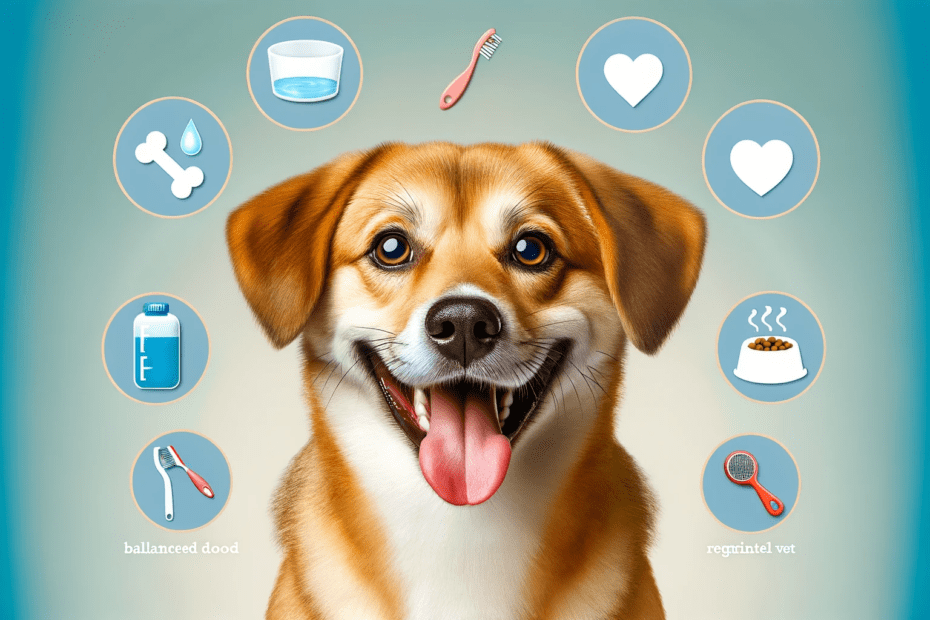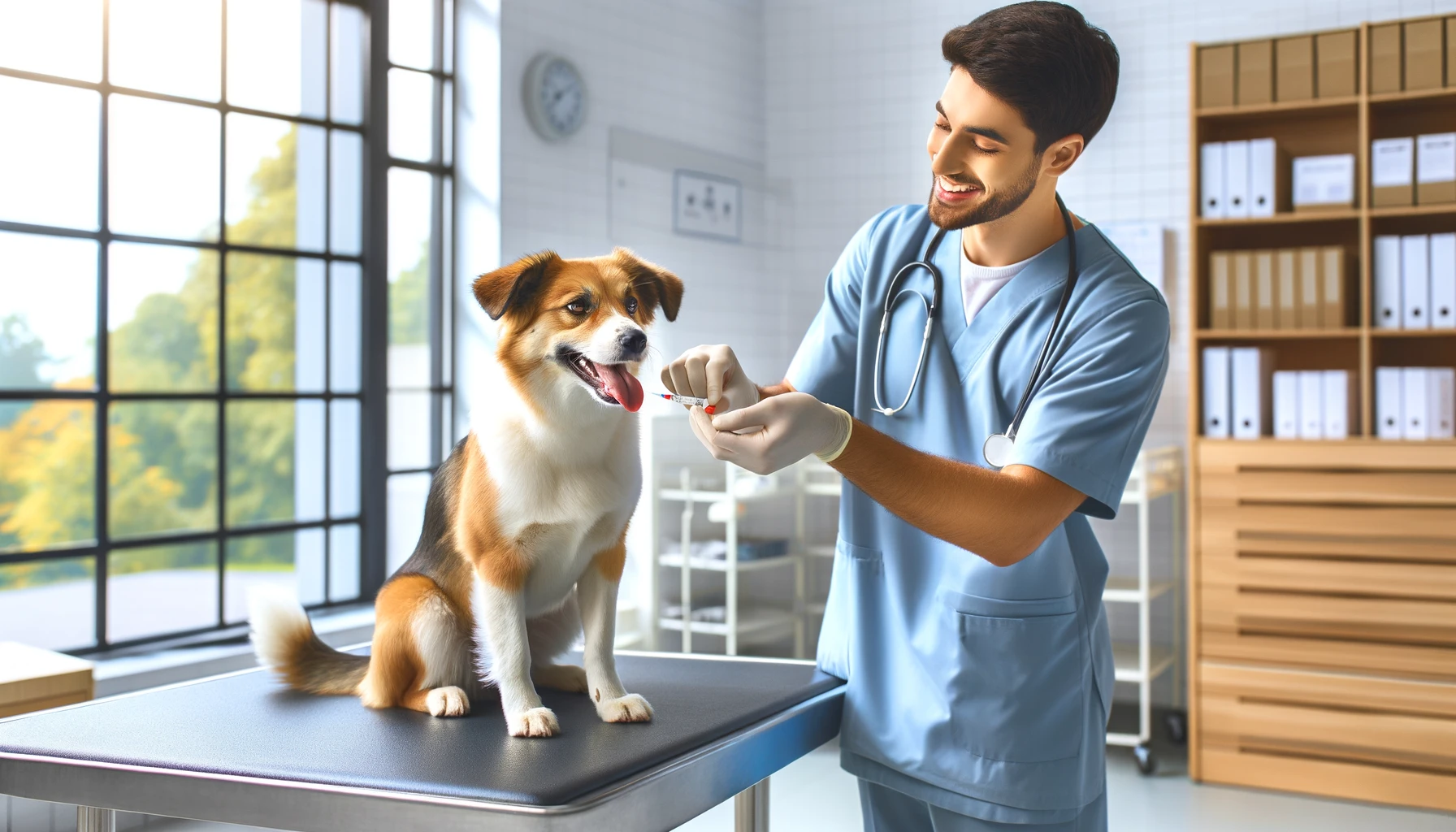Are you worried about your furry friend's health? Don't fret! We've got you covered with six simple tips to tackle common dog health concerns.
From pesky fleas and ticks to dental care, allergies, digestive issues, joint problems, and anxiety, we've got the answers you need.
Take charge of your dog's well-being with these easy solutions. Your pup will thank you!
Key Takeaways
- Use a recommended flea and tick preventative treatment to avoid skin irritation, itching, and allergic reactions caused by fleas. Fleas can also transmit diseases like Bartonellosis and tapeworm infestations.
- Regularly check your dog's coat for fleas and ticks and remove them immediately to prevent the transmission of diseases such as Lyme disease and Rocky Mountain spotted fever.
- Take preventive measures such as using topical treatments or oral medications to protect your dog from other parasites and regularly check your dog for signs of parasites.
- Prevent dental diseases by regular brushing and annual check-ups, and incorporate dog-friendly toothpaste and natural dental chews into your dog's routine to prevent plaque and tartar buildup which can lead to gum disease and tooth loss.
Fleas and Ticks
To effectively prevent fleas and ticks on your dog, regularly use a flea and tick preventative treatment recommended by your veterinarian. Fleas and ticks aren't only annoying, but they can also pose serious health risks for your furry friend. Flea prevention is crucial because fleas can cause skin irritation, itching, and allergic reactions. They can also transmit diseases such as Bartonellosis and tapeworm infestations.
Tick control is equally important as ticks can transmit Lyme disease, Rocky Mountain spotted fever, and other tick-borne illnesses. Regularly using a flea and tick preventative treatment can help protect your dog from these pesky parasites. Your veterinarian can recommend the most appropriate treatment based on your dog's breed, age, and overall health. It's important to follow the instructions carefully and apply the treatment as directed.
Additionally, it's a good idea to regularly check your dog's coat for any signs of fleas or ticks, especially after spending time in wooded areas or tall grass. If you notice any parasites, remove them immediately using tweezers or a tick removal tool. Taking proactive measures to prevent flea and tick infestations will ensure the health and well-being of your beloved pet.
Dental Care
Taking care of your dog's dental health is essential for their overall well-being. By preventing dental diseases, you can help your dog avoid pain, infection, and even tooth loss.
Using dog-friendly dental products, such as toothpaste and toothbrushes specifically designed for dogs, can make it easier to keep their teeth clean and healthy.
Preventing Dental Diseases
Keep your dog's teeth healthy and prevent dental diseases with regular brushing and annual dental check-ups. Good dental hygiene is essential for your dog's overall health.
Brush your dog's teeth daily using a toothbrush and toothpaste specially formulated for dogs. This helps remove plaque and prevent tartar buildup, which can lead to gum disease and tooth loss.
It's also important to have your dog's teeth professionally cleaned by a veterinarian at least once a year. During the dental check-up, your vet will examine your dog's teeth and gums for any signs of disease or infection. They may recommend additional treatments such as dental scaling or extractions if necessary.
Dog-Friendly Dental Products
Maintain your dog's dental health by incorporating dog-friendly dental products into their dental care routine. Using dog-friendly toothpaste is an essential part of keeping your dog's teeth clean and healthy. Regular toothpaste can be harmful to dogs, so it's important to use toothpaste specifically formulated for dogs. These toothpastes come in various flavors that dogs love, making brushing a more enjoyable experience for them.
Additionally, natural dental chews are another great option to promote good oral health. These chews are made from natural ingredients and help to remove plaque and tartar buildup, reducing the risk of dental disease. They also satisfy your dog's natural chewing instinct.
Incorporating dog-friendly toothpaste and natural dental chews into your dog's dental care routine will help keep their teeth clean and breath fresh.
Allergies and Skin Conditions
To effectively manage allergies and skin conditions in your dog, regularly consult with a veterinarian for proper diagnosis and treatment options.
Skin allergies can cause discomfort and irritation for your furry friend, but there are ways to alleviate their symptoms. One common skin condition in dogs is hot spots, which are areas of inflamed, itchy skin that can become infected if not treated promptly. If you notice your dog scratching or licking excessively, it may be a sign of allergies or a skin condition.
Your veterinarian can perform tests to determine the cause of these symptoms and provide the appropriate treatment. Treatment options may include medications to reduce itching and inflammation, special diets to identify any food allergies, or topical treatments to soothe the skin. It's important to follow your veterinarian's recommendations and keep your dog's skin clean and dry to prevent further irritation.
Additionally, regular grooming can help remove allergens and reduce the risk of skin allergies.
Digestive Issues
If your dog experiences digestive issues, it's important to monitor their symptoms and seek veterinary guidance for proper diagnosis and treatment. Canine indigestion can manifest as symptoms such as vomiting, diarrhea, and loss of appetite.
One common cause of indigestion is dietary indiscretion, where dogs consume something they shouldn't, like spoiled food or foreign objects. To help your dog with an upset stomach, there are a few remedies you can try.
First, you can try withholding food for 12 to 24 hours, giving their system time to rest and recover. After this fasting period, you can introduce a bland diet consisting of boiled chicken and rice in small, frequent meals. This is easily digestible and can help soothe their stomach.
Additionally, you can try giving your dog probiotics, which can promote healthy gut bacteria and aid in digestion.
It's important to note that while these remedies may offer temporary relief, it's vital to consult with your veterinarian to identify the underlying cause and develop a long-term solution for your dog's digestive issues.
Joint and Mobility Problems
If your dog is experiencing joint and mobility problems, there are several things you can do to help.
Prevention is key, so make sure your dog maintains a healthy weight and engages in regular exercise.
If your dog is already facing mobility issues, consult with your veterinarian to develop a management plan that may include medication, physical therapy, or joint supplements.
Preventing Joint Issues
You can prevent joint issues and mobility problems in your dog by taking proactive steps to promote joint health. Here are four tips to help maintain your dog's joint health:
- Provide joint supplements: Consult with your veterinarian about adding joint supplements to your dog's diet. These supplements contain ingredients like glucosamine and chondroitin, which can support joint health and reduce the risk of issues.
- Maintain a healthy weight: Excess weight puts unnecessary stress on your dog's joints. Ensure your dog is at a healthy weight by feeding a balanced diet and providing regular exercise.
- Establish an exercise routine: Regular exercise helps keep your dog's joints strong and flexible. Engage in activities like walking, swimming, or playing fetch, but be mindful of your dog's breed and individual needs.
- Avoid overexertion: While exercise is important, it's crucial to avoid overexerting your dog. Monitor their activity level and provide appropriate rest periods to prevent strain on their joints.
Managing Mobility Problems
To effectively manage mobility problems in your dog, start by addressing any joint and mobility issues promptly.
One common mobility problem in dogs is arthritis, which can cause pain and stiffness in their joints. Managing arthritis involves several strategies to improve your dog's mobility.
First, you can provide them with a comfortable and supportive bed to alleviate any discomfort.
Additionally, regular low-impact exercise, such as swimming or walking on soft surfaces, can help strengthen their muscles and reduce joint stress.
It's also important to maintain a healthy weight for your dog, as excess weight can worsen joint problems.
Lastly, consider incorporating joint supplements and anti-inflammatory medications, under the guidance of your veterinarian, to further manage your dog's arthritis and improve their mobility.
Anxiety and Behavioral Concerns
One common concern for dog owners is their dog's anxiety and behavioral issues. Dogs can experience anxiety for various reasons, such as separation anxiety when left alone or fear of certain situations. These behavioral concerns can be distressing for both the dog and the owner. However, there are effective training techniques that can help alleviate anxiety and improve your dog's behavior.
Here are four tips to address anxiety and behavioral concerns in your dog:
- Positive Reinforcement: Use rewards and praise to reinforce desired behaviors. This will help your dog associate positive experiences with certain actions, reducing anxiety and promoting good behavior.
- Counterconditioning: Gradually expose your dog to the situations or triggers that cause anxiety, while providing positive experiences and rewards. This will help your dog overcome their fears and anxieties over time.
- Physical and Mental Stimulation: Ensure your dog gets enough exercise and mental stimulation to prevent boredom and reduce anxiety. Engage them in activities like puzzle toys, obedience training, and interactive play.
- Consult a Professional: If your dog's anxiety and behavioral concerns persist or worsen, it's advisable to seek professional help from a veterinarian or certified dog trainer. They can provide tailored guidance and support to address your dog's specific needs.
Frequently Asked Questions
How Do I Prevent My Dog From Getting Fleas and Ticks?
To prevent your dog from getting fleas and ticks, use natural remedies like essential oils or flea and tick collars. Regularly check your dog's fur and environment for signs of infestation, and keep your dog's living area clean.
What Are Some Signs That My Dog May Have Dental Problems?
If your dog has bad breath, swollen gums, or is having difficulty eating, these may be signs of dental problems. Regular dental care, such as brushing their teeth, can help prevent these issues.
Can Allergies and Skin Conditions in Dogs Be Managed Without Medication?
You can manage allergies and skin conditions in dogs without medication. Natural remedies and alternative treatments are available. These can help alleviate symptoms and improve your dog's overall health and well-being.
What Should I Do if My Dog Has Digestive Issues Such as Diarrhea or Vomiting?
If your dog is experiencing digestive issues like diarrhea or vomiting, there are home remedies you can try. Make sure to provide a bland diet, keep them hydrated, and consult a vet if symptoms persist.
Are There Any Natural Remedies or Supplements That Can Help With Joint and Mobility Problems in Dogs?
If your dog is experiencing joint problems or mobility issues, there are natural remedies and supplements available. Consult with your veterinarian to find the best options for your dog's specific needs.
Conclusion
In conclusion, by following these simple tips, you can address common health concerns in dogs effectively.
Regularly check for fleas and ticks, maintain good dental care, and address allergies and skin conditions promptly.
Additionally, ensure a healthy digestive system, provide support for joint and mobility problems, and address anxiety and behavioral concerns.
By taking these proactive measures, you can keep your furry friend healthy and happy for years to come.






